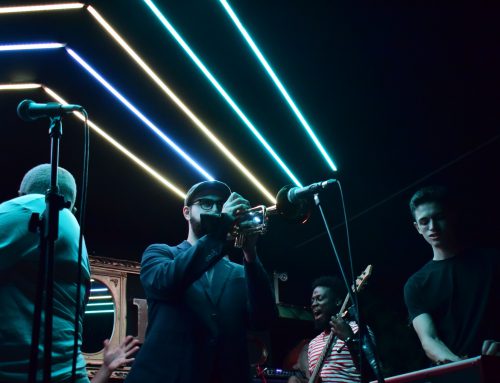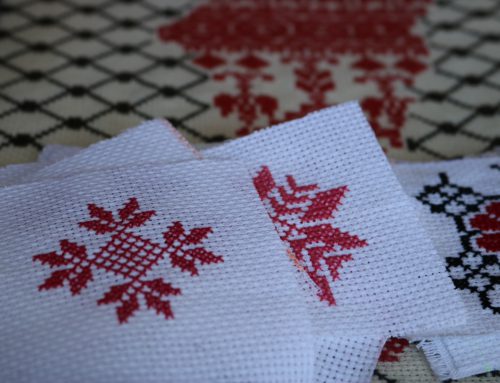BY Angélica Rameau-Galette & Camila Caridad Rivas
Mylène Laverdure stands in front of the wardrobe of her workshop and pulls out a costume inspired by Leila, a character in the Fire Emblem fantasy role-playing game.
“This is the first one I made,” she says with a smile.
A chair not too far from where she is standing is covered with an ever-growing pile of cosplay costumes she has created over the years.
During the last two years, Laverdure has not spent as much time as she would have liked in her workshop to create new costumes.
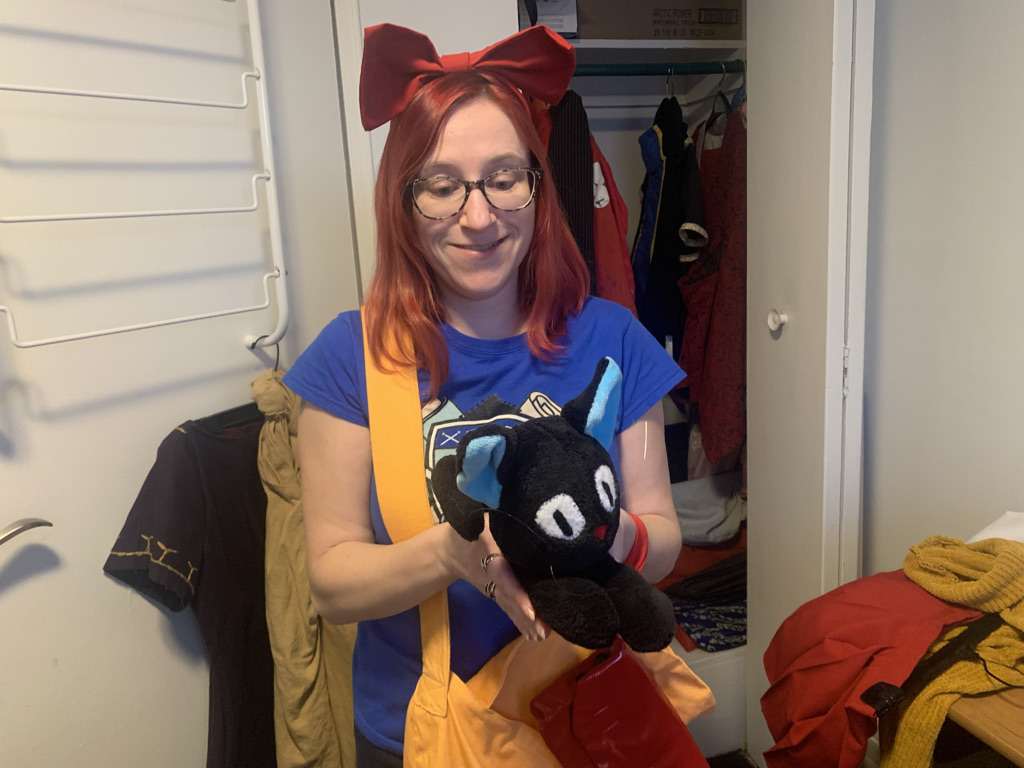
Mylène Laverdure holds a stuffed cat that she sewed herself. Jiji, the famous cat, is Kiki’s companion, the main character of a Japanese animated film called Kiki’s Delivery Service (1989). Photo by Angélica Rameau-Galette.
Montreal’s geek culture hasn’t avoided the effects of the pandemic. Popular geek conventions and events such as Comiccon and Otakuthon were cancelled.
The Japanese anime convention Otakuthon takes place for three days every year. The event presents various Japanese pop-culture interests such as comics and novels, gaming, art, masquerade and panels.
Events like Otakuthon are among the many aspects of geek culture. Geek-related interests include a love for anime, cosplay, video games, masquerade, science fiction and superhero films, among others. Such interests are considered unconventional and obscure media outside of the geek community.
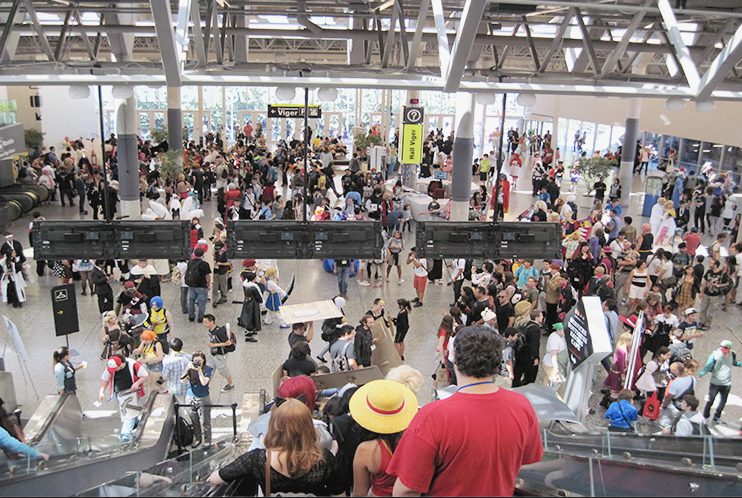
21,315 people attend Otakuton’s 11th edition in 2016 at the Palais des Congrès. Photo courtesy of Mylène Laverdure.
For cosplay enthusiasts like Laverdure, the pandemic and the numerous cancellations of geek events have affected both her plans and passion.
“To be honest, my plans are on ice. I try to continue [sewing] to keep the flame, to keep a foot in cosplay,” she says.
Laverdure got into cosplay at the age of 18 when she attended Montreal’s first Otakuthon convention in 2006. She would later learn how to sew in 2013 and has been creating her cosplay costumes ever since.
“I was a very shy person, so it allowed me to get out of my comfort zone,” Laverdure says.
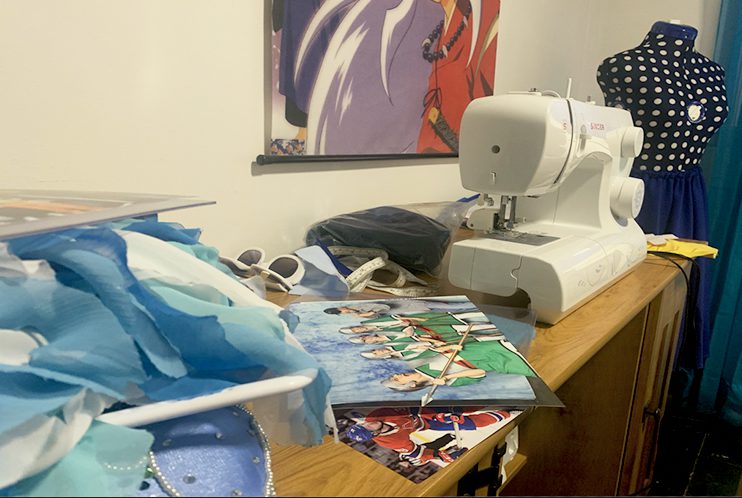
Mylène Laverdure keeps most of her costumes, sewing patterns and photographs from past conventions in her workshop, where she usually spends her time creating her cosplays. Photo by Angélica Rameau-Galette.
Stéphanie Beaulieu has also had her passion affected by the pandemic. The 34-year-old has cosplayed around the globe such as in China, London, Scotland and France. “I miss it a lot actually,” she says.
Although the pandemic has limited the accessibility and the ability to socialize at geek events, she says it has encouraged the community to explore and work on their creativity.
“I’ve seen a lot of people still working on their cosplay from home or having projects. I think it’s still present. Eventually, people are going to come out and join conventions again,” she says.
Beaulieu believes the pandemic has also contributed to the popularity of specific interests linked to geek culture. “Anime is getting more predominant and with Netflix, it gets more exposure,” she says.
According to Marie-Michèle Tourigny-Houle, a geek culture expert and researcher at l’Université du Québec à Montréal, the past few years have been successful for geek culture as it has risen in popularity.
Tourigny-Houle says that the release of the X-Men movie in 2000 and the release of other Marvel movies contributed to the emergence of geek culture.
Among all of this, the geek culture expert says that determining Montreal’s presence in geek culture remains challenging. “Geek culture is very rooted in popular culture with a lot of American inspiration, so it is more English-speaking,” she says.
However, Tourigny-Houle says that Montreal is a hub for video games and production companies that are recognized globally, such as Ubisoft. Even if production is somewhat limited here, Tourigny-Houle believes it allows francophone productions to stand out.
Montreal has been recognized as the fifth most important video game hub in the world.
Given that these interests in geek culture have attracted a larger audience beyond the geek community, Tourigny-Houle says that it is now considered mainstream in North America.
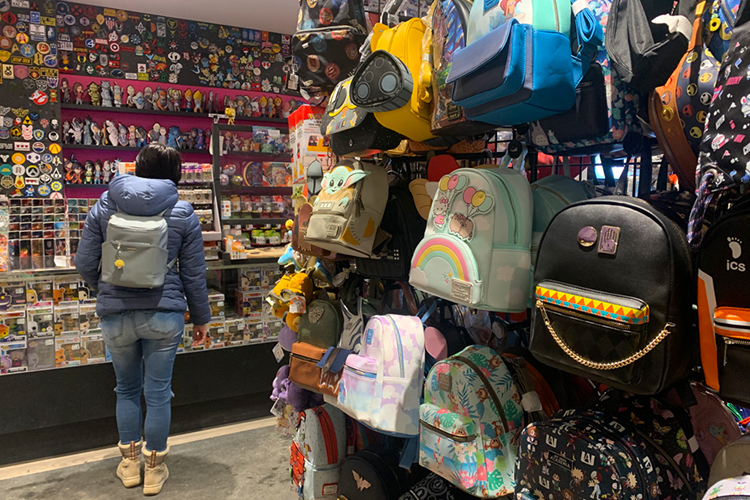
A customer is looking at the various collection of figurines and FunkoPop’s at Chez Rhox, a Montreal geek shop in La-Petite-Patrie. Photo by Angélica Rameau-Galette.
“When you go mainstream, you lose a bit of your unity because you become like everyone else,” she says.
Tourigny-Houle believes Montreal’s geek culture will progressively redefine itself in the next few years.
“I’m hoping the geeks didn’t lose their fire by having the ability to meet on different digital platforms. But I think the geek is above all a social being, so, for those who socialized mostly through face-to-face activities, it was perhaps more difficult to stay connected, and the pandemic must limit their ability to express their passion,” she says.
However, the pandemic has had some positive effects on geek culture as well. Its popularity has encouraged the growth of businesses that have found their own ways to survive the pandemic.
Montreal geek store Chez Rhox innovates the way it reaches its customers during the pandemic. Video by Camila Rivas.
For Ryan Gelinas, host and creator of The Ryan Stick Show, a podcast about geek culture, the pandemic has had a positive effect on the geek community.
“What happened in the pandemic kind of feels like a time machine to me,” says Gelinas. “People consider it a worldwide pandemic, I consider it as the 90s,” he adds.
Gelinas believes that the pandemic may have drawn the geek community closer by relying on the internet and sharing interests in smaller groups.
“Social media and the internet is an amazing thing when someone you’ve never met in your life in Australia happens to have the same favourite cartoon that you do, and you’re communicating with them like your old friends but you’ve just met them,” he says.
Although most geek-related events were cancelled or postponed, some popular conventions like Otakuthon and MEGA+MIGS, a Canadian video game conference, opted for online events.
With the ease of certain restrictions, Montreal’s Comiccon holiday edition took place at the Palais des congrès in December 2021.
“It was a very good feeling to have the mini Comiccon back in December because you’re in a room again, full of people. You almost forget that beautiful energy when all these people come together for the singular purpose that they just love the lifestyle and they love to celebrate this geek culture all together,” says Gelinas who is also part of the Comiccon social media management team.
Gelinas says that wearing masks is nothing new for people who attend Comiccon. “Cosplayers who go to Comiccon are no strangers to wearing masks nine hours a day in order to look cool,” he says.
“I think geeks are tougher than people are willing to give them [credit for]. Geeks know how to thrive when everybody is telling you it’s a little difficult to like what you like,” the show host says.
“Whatever happens, they are still going to love what they love.”



